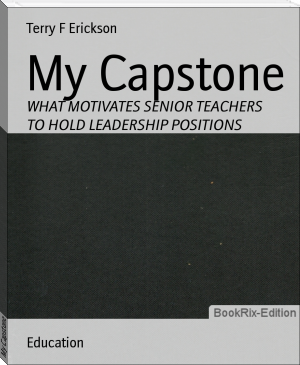My Capstone, Terry F Erickson [classic novels .txt] 📗

- Author: Terry F Erickson
Book online «My Capstone, Terry F Erickson [classic novels .txt] 📗». Author Terry F Erickson
education, 63, 217-228.
Thompson, S.C., Gregg, L., & Niska, J.M. (2004). Professional learning communities, leadership, and student learning. Research in middle level education online, 28, 35-54.
Timperley, H.S. (2005). Distributed leadership: developing theory from practice. Journal of curriculum studies, 37, 395-420.
Tschannen-Moran, M., & Woolfolk Hoy, A. (2001). Teacher efficacy: capturing an elusive construct. Teaching and teacher education, 17, 783-805.
U.S. Department of Education, Office of Educational Research and Improvement. (1997). Job Satisfaction Among America’s Teachers: Effects of Work Place Conditions, Background Characteristics, and Teacher Compensation. Washington, D.C.
Wallace Foundation. (2004). How leadership influences student learning. New York: Leithwood, K., Louis, K., Anderson, S., & Wahlstrom, K.
Walters, S, & Guthro, C. (1992). Leading, learning, leaving. In C. Livingston (Ed.), Teachers as leaders: evolving roles (pp. 131-158). Washington, D.C.: National Education Association.
Wasley, P. (1992). Working together: teacher leadership and collaboration. In C. Livingston (Ed.), Teachers as leaders: evolving roles (pp. 21-56).
Weathersby, J., & Harkreader, S. (2000). Staff development and the link to student achievement. Catalyst for change, 29, 9-12.
Weiss, C.H., Cambone, J., & Wyeth, A. (1992). Trouble in paradise: teacher conflicts in shared decision making. Educational administration quarterly, 28, 350-367.
Witcher, A.E. (2001). Promoting teachers as participants in policy design. Kappa delta pi record, 37, 88-90.
York-Barr, J., & Duke, K. (2004). What do we know about teacher leadership? Findings from two decades of scholarship. Review of educational research, 74, 225-316.
Imprint
Thompson, S.C., Gregg, L., & Niska, J.M. (2004). Professional learning communities, leadership, and student learning. Research in middle level education online, 28, 35-54.
Timperley, H.S. (2005). Distributed leadership: developing theory from practice. Journal of curriculum studies, 37, 395-420.
Tschannen-Moran, M., & Woolfolk Hoy, A. (2001). Teacher efficacy: capturing an elusive construct. Teaching and teacher education, 17, 783-805.
U.S. Department of Education, Office of Educational Research and Improvement. (1997). Job Satisfaction Among America’s Teachers: Effects of Work Place Conditions, Background Characteristics, and Teacher Compensation. Washington, D.C.
Wallace Foundation. (2004). How leadership influences student learning. New York: Leithwood, K., Louis, K., Anderson, S., & Wahlstrom, K.
Walters, S, & Guthro, C. (1992). Leading, learning, leaving. In C. Livingston (Ed.), Teachers as leaders: evolving roles (pp. 131-158). Washington, D.C.: National Education Association.
Wasley, P. (1992). Working together: teacher leadership and collaboration. In C. Livingston (Ed.), Teachers as leaders: evolving roles (pp. 21-56).
Weathersby, J., & Harkreader, S. (2000). Staff development and the link to student achievement. Catalyst for change, 29, 9-12.
Weiss, C.H., Cambone, J., & Wyeth, A. (1992). Trouble in paradise: teacher conflicts in shared decision making. Educational administration quarterly, 28, 350-367.
Witcher, A.E. (2001). Promoting teachers as participants in policy design. Kappa delta pi record, 37, 88-90.
York-Barr, J., & Duke, K. (2004). What do we know about teacher leadership? Findings from two decades of scholarship. Review of educational research, 74, 225-316.
Imprint
Publication Date: 10-28-2011
All Rights Reserved
Free e-book «My Capstone, Terry F Erickson [classic novels .txt] 📗» - read online now
Similar e-books:





Comments (0)